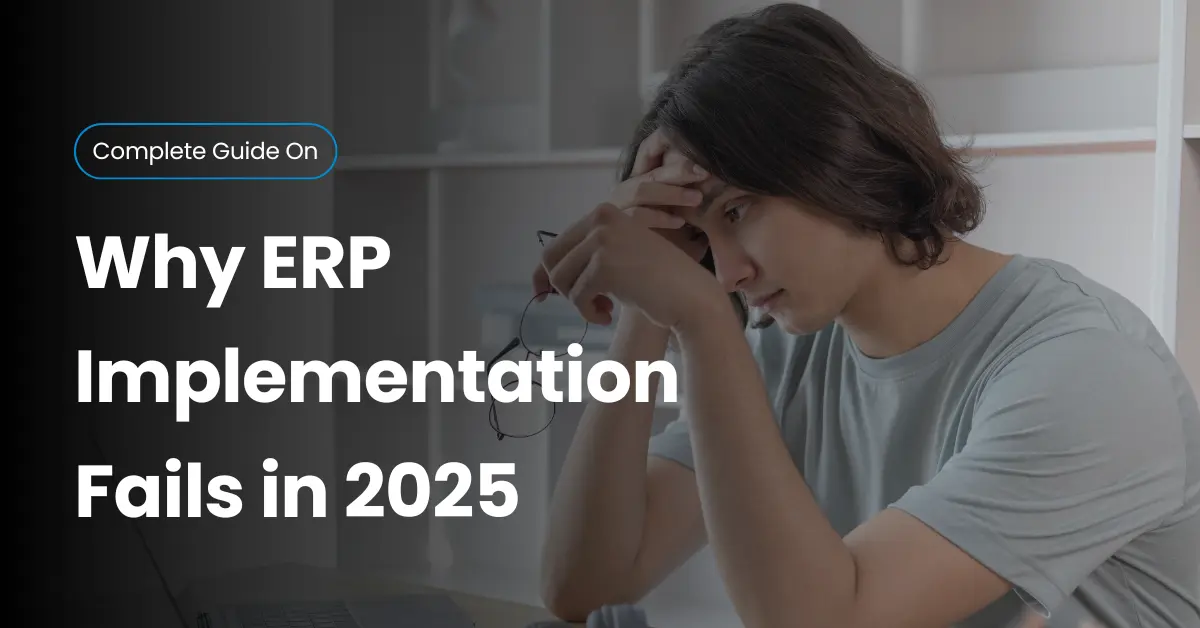At Infintrix, we’ve walked into countless boardrooms where the mood was the same: frustration. Companies invest heavily in ERP systems, hoping for clarity and efficiency—only to end up with missed deadlines, ballooning costs, and employees retreating to spreadsheets.
If you’ve been there—or you’re afraid of ending up there—you’re not alone. Research shows that most ERP implemented projects either fail outright or deliver far less value than promised. For CEOs and CFOs, it’s more than wasted budget—it’s disruption, lost trust, and stalled growth.
But here’s the part most executives miss: ERP failure isn’t inevitable. In fact, the reasons projects collapse are surprisingly predictable—poor planning, weak change management, and the wrong implementation partner. With the right expertise, those same pitfalls can be avoided.
So the real question isn’t “Will ERP fail?” It’s “Will we bring in the right guidance to succeed?”
The High Stakes of ERP Implementation
For mid-sized manufacturers, distributors, and service companies, ERP isn’t just another IT project—it’s a bet on the future. The right system can streamline operations, cut costs, and give leadership the visibility they’ve been craving. But if it goes wrong? The consequences ripple through every corner of the business.
Executives worry about the same things every time:
- Cost overruns that drain resources from other strategic initiatives
- Downtime that halts production or delays customer deliveries
- Employee pushback when new systems feel harder than the old way
- Disruption to cash flow when billing or procurement processes stumble
An ERP software deployment touches finance, supply chain, sales, and even customer service. That’s why the stakes feel so high. When implementation falters, it doesn’t just hurt IT—it slows the entire business.
This is the backdrop for most ERP conversations: enormous potential on one side, and very real risk on the other.
The Top Reasons ERP Projects Fail
Most ERP projects don’t collapse because the software itself is bad. They fail because of predictable mistakes in how the system is planned, rolled out, and supported. Here are the most common traps we see:
Poor Planning and Lack of Clear Objectives
Too often, companies rush in without defining what success looks like. If the goal is just “go live,” the project misses the bigger picture—efficiency, visibility, and growth.
Underestimating the Complexity of Business Processes
ERP systems are designed to mirror real-world workflows. However, when companies overlook the messiness of their own processes, the system ends up clashing instead of fitting.
Insufficient Change Management
An ERP rollout isn’t just technical—it’s cultural. Without training and communication, employees resist change, creating hidden roadblocks.
Choosing the Wrong ERP Partner or Vendor
The wrong partner can turn a solid product into a nightmare. A good consultant adapts the system to your business—not the other way around.
Limited Executive Buy-In
If leadership isn’t fully engaged, projects lose momentum. ERP needs visible commitment from the top.
Data Migration Challenges
Bad data in, bad data out. Many projects stumble when outdated or inconsistent data derails the transition.
The takeaway? ERP projects fail for reasons you can spot—and prevent—well before they become disasters.
The Hidden Costs of Failure
When an ERP project misses the mark, the wasted ERP implementation budget is the most visible pain. But the real damage often runs much deeper. We’ve seen companies limp along for years after a failed rollout, carrying scars that never show up on the balance sheet.
- Employee frustration: When staff are forced to work with a clunky system—or worse, a half-finished one—they quickly lose confidence. Morale dips, turnover rises, and productivity stalls.
- Stalled growth: Instead of enabling scalability, a broken ERP becomes a bottleneck. Expansion plans get delayed because the system can’t handle new locations, products, or customers.
- Compliance and audit risks: In industries with tight regulations, messy data or inconsistent processes can trigger compliance violations or audit failures.
- Customer dissatisfaction: Late shipments, billing errors, and poor communication don’t just frustrate employees—they directly affect customer trust.
The real cost of ERP failure isn’t just financial—it’s the opportunity you lose while your competitors keep moving forward.
How Professional Expertise Turns the Odds Around
The good news? ERP projects don’t have to be horror stories. In fact, when guided by the right expertise, they can become the foundation for efficiency, growth, and confidence across the organization. The difference comes down to experience. Seasoned ERP consultants know the traps to avoid and how to set up the project for success.
Vendor-Neutral Guidance
Most ERP vendors are focused on selling licenses, not ensuring your business thrives. Independent consultants bring vendor-neutral advice, helping you select the platform that truly fits your needs—not the one with the flashiest demo.
Tailored Implementation Roadmaps
Every business is unique. A cookie-cutter rollout almost guarantees friction. Experts build a roadmap that aligns with your processes, priorities, and budget, ensuring the project stays on track.
Training and User Adoption Strategies
ERP only works if people use it. Consultants design training and communication plans that win employee buy-in, making the transition smoother and adoption faster.
Ongoing System Optimization
ERP isn’t “set it and forget it.” Continuous monitoring and adjustments ensure the system evolves with your business, delivering long-term ROI instead of short-term headaches.
With the right professional guidance, ERP transforms from a risky gamble into a powerful enabler of growth.
Signs Your Company Needs Expert ERP Support
Not every ERP challenge means your system is doomed. But there are clear warning signs that professional expertise could make the difference between stumbling along and finally seeing results. If any of these sound familiar, it may be time to bring in help:
- A previous ERP attempt failed or stalled – You invested time and money, but the project never delivered what was promised.
- Employees resist using the system – Staff default back to spreadsheets or old tools because the ERP feels confusing or incomplete.
- Processes feel more complicated, not less. Instead of streamlining operations, the system has added layers of inefficiency.
- Departments don’t talk to each other – Sales, finance, and operations remain siloed, with little integration across workflows.
- Key metrics are hard to track – Leadership struggles to get real-time visibility into performance, cash flow, or inventory.
If two or more of these points hit home, it’s a strong signal your ERP journey needs outside expertise to get back on track.
Best Practices for a Successful ERP Implementation
Avoiding failure isn’t just about steering clear of mistakes—it’s about setting your project up for success from day one. Over the years, we have found that companies that follow these best practices to implement an ERP system are the ones that not only launch smoothly but also see lasting ROI.
1. Define Business Objectives Clearly
Don’t start with “we need ERP.” Start with why. Are you trying to improve supply chain visibility? Speed up financial closes? Reduce manual work? Clear goals give the project direction and measurable success criteria.
2. Involve Leadership and Cross-Functional Teams Early
ERP touches every department. By involving executives and frontline teams from the start, you avoid misalignment and ensure buy-in across the business.
3. Select the Right ERP Partner, Not Just the Software
The best software in the world will fail with the wrong partner. Choose an implementation team that understands your industry, not just the technology.
4. Prioritize Change Management and Training
People resist what they don’t understand. A structured change management plan—complete with communication, training, and ongoing support—makes adoption smoother.
5. Continuously Monitor KPIs Post-Launch
Go-live isn’t the finish line. Track key performance indicators (KPIs) regularly to make sure the system is driving the improvements you set out to achieve.
Success comes from treating ERP as a business transformation, not just a software rollout.
Final Thoughts – Turning Risk into ROI
ERP projects have a reputation for being risky, but failure isn’t written into the process. The companies that stumble usually do so because they underestimate the complexity or try to go it alone. The ones that succeed approach ERP as a business transformation—anchored in strategy, guided by expertise, and powered by their people.
When you invest in experienced guidance, the risks that once felt overwhelming—budget overruns, downtime, employee resistance—become manageable. With the right roadmap, leadership involvement, and ongoing optimization, ERP stops being a gamble and becomes a catalyst for growth.
The bottom line is this: ERP success isn’t about luck or picking the “perfect” software. It’s about having the right plan, the right ERP Implementation partner, and the right commitment. When those elements come together, ERP shifts from being a source of fear to one of your company’s most valuable assets.
FAQs
Why do so many ERP implementations fail?
Most failures trace back to poor planning, lack of change management, and choosing the wrong partner. It’s rarely the software itself—it’s how the project is approached.
What are the biggest risks in ERP projects?
The top risks include cost overruns, downtime, employee resistance, and data migration issues. Without strong leadership and expert guidance, these risks compound quickly.
How do I know if my company needs ERP consultants?
If your project has stalled, employees avoid using the system, or processes feel more complicated post-implementation, it’s a strong sign that outside expertise could help.
Can small to mid-sized businesses avoid ERP failure?
Absolutely. In fact, smaller companies often succeed faster because they can adapt more quickly—if they follow best practices and bring in the right guidance.
What’s the average cost of a failed ERP project?
It varies, but research shows failed implementations can run into the millions, factoring in direct expenses plus the hidden costs of lost productivity and stalled growth.
How long does a successful ERP implementation usually take?
For mid-sized businesses, timelines typically range from 6 to 18 months, depending on complexity, data readiness, and user adoption.

